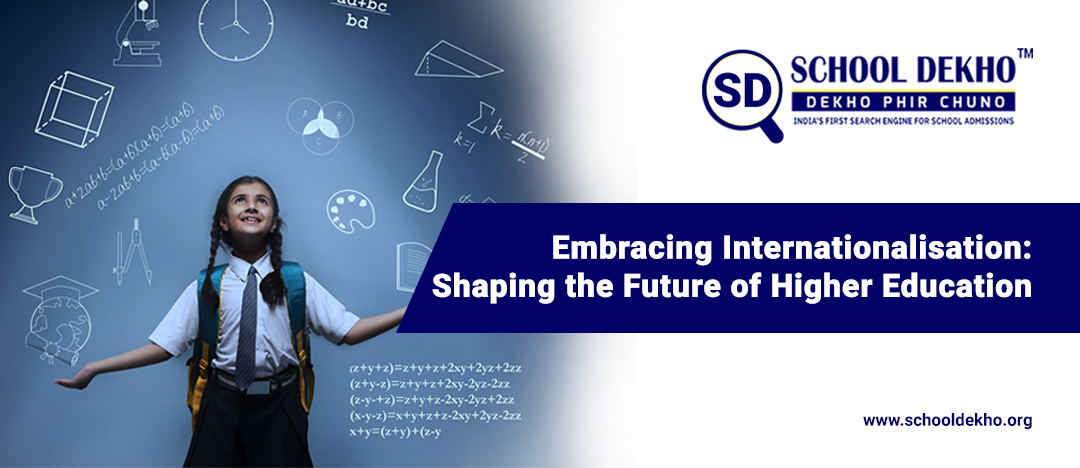Embracing Internationalisation: Shaping the Future of Higher Education

The landscape of higher education is undergoing a profound transformation, characterized by visible changes that are shaping the future of learning. With a clear trajectory towards scalability, accessibility, and technological integration aligned with global standards, the education system is evolving to meet the demands of the global labor market. As the world becomes increasingly interconnected, internationalisation emerges as a pivotal force to foster an environment conducive to student integration into the global community and to institute policies that revolutionize the dynamics of higher education on a global scale.
Internationalisation, a multifaceted phenomenon, is now at the forefront of higher education agendas, with numerous institutions designating it as their primary strategic goal. Indian higher education institutions, in particular, are making dedicated efforts to expand their global footprint, attracting foreign students, faculty, and investment to fuel growth. When it comes to private higher education systems, India, China, and the United States hold the top positions. Among these, India stands out as a frontrunner, claiming a substantial 21.9% share in global private higher education and boasting enrolments reaching 64.3%.
The essence of internationalisation encompasses a wide array of factors, appealing to various groups for diverse reasons. The significance of this trend extends beyond educational institutions, capturing the attention of stakeholders due to its political, socio-cultural, economic, intellectual, and commercial implications.
Scalability and Accessibility: The evolution of higher education is synonymous with scalability and accessibility. Institutions are driven to accommodate a larger and more diverse student body, leveraging technological advancements and innovative approaches to impart education beyond geographical boundaries. This push toward accessibility aligns with internationalisation's goal of offering quality education to students across the globe.
Technological Integration and Global Standards: As the world becomes digitally connected, higher education is embracing technology to enhance learning experiences. Internationalisation nudges institutions to adhere to global educational standards, ensuring that graduates are well-equipped to navigate a technology-driven global workforce.
Global Labor Market Dynamics: The transformation in higher education is intrinsically linked to the demands of the worldwide labor market. Graduates are expected to possess not only technical skills but also cultural sensitivity, adaptability, and global perspectives. Internationalisation fosters the development of these traits, making graduates more marketable and versatile.
Student Integration: Internationalisation creates an environment that prepares students to thrive in a global community. Exposure to diverse cultures, languages, and viewpoints enhances cross-cultural understanding and communication skills, preparing students for the challenges of a globalized world.
Faculty Exchange and Collaboration: Faculty members benefit from internationalisation through exposure to diverse teaching methodologies and research collaborations. Interactions with peers from around the world foster the exchange of ideas, leading to cross-pollination of knowledge and innovative research.
Economic Growth and Investment: The internationalisation of higher education attracts foreign students and investments, contributing to the economic growth of host countries. This financial influx supports infrastructure development, research initiatives, and overall academic excellence.
Cultural Enrichment: Internationalisation promotes cultural exchange and understanding, cultivating an environment of tolerance and diversity. This cultural enrichment extends beyond the classroom, impacting societal harmony and global relationships.
In conclusion, the transformation in higher education is unmistakable, driven by a commitment to internationalisation. With a globalized labor market, technological advancements, and an interconnected world, institutions are compelled to adapt and offer a learning experience that prepares students for the challenges of the future. The widespread interest in internationalisation underscores its significance as a dynamic force that transcends mere academic evolution, shaping political, economic, and cultural landscapes. As the journey continues, the education system is poised to create global citizens who are not only academically proficient but also equipped to contribute positively to a harmonious and interconnected world.
Contact with Us
Call: 1800 - 2588 - 074
Mail: info@schooldekho.org
Student’s Best Education Portal | School Dekho | India's First School Search Engine | Best Schools Near Me | Find Schools Near Me | Dekho Phir Chuno
#dekhophirchuno






